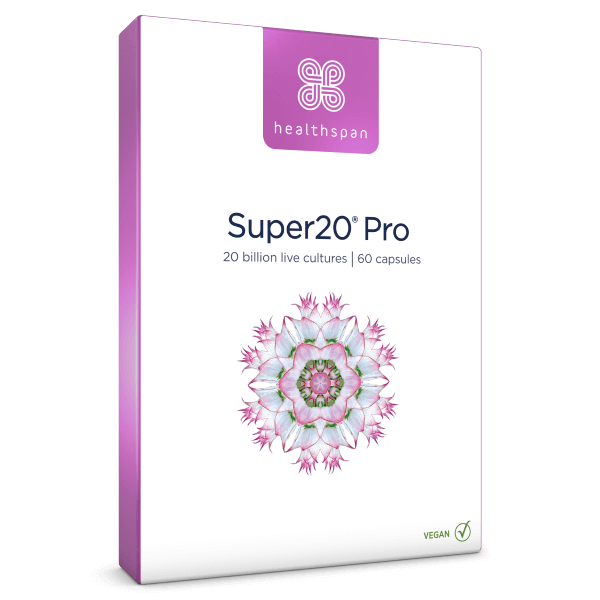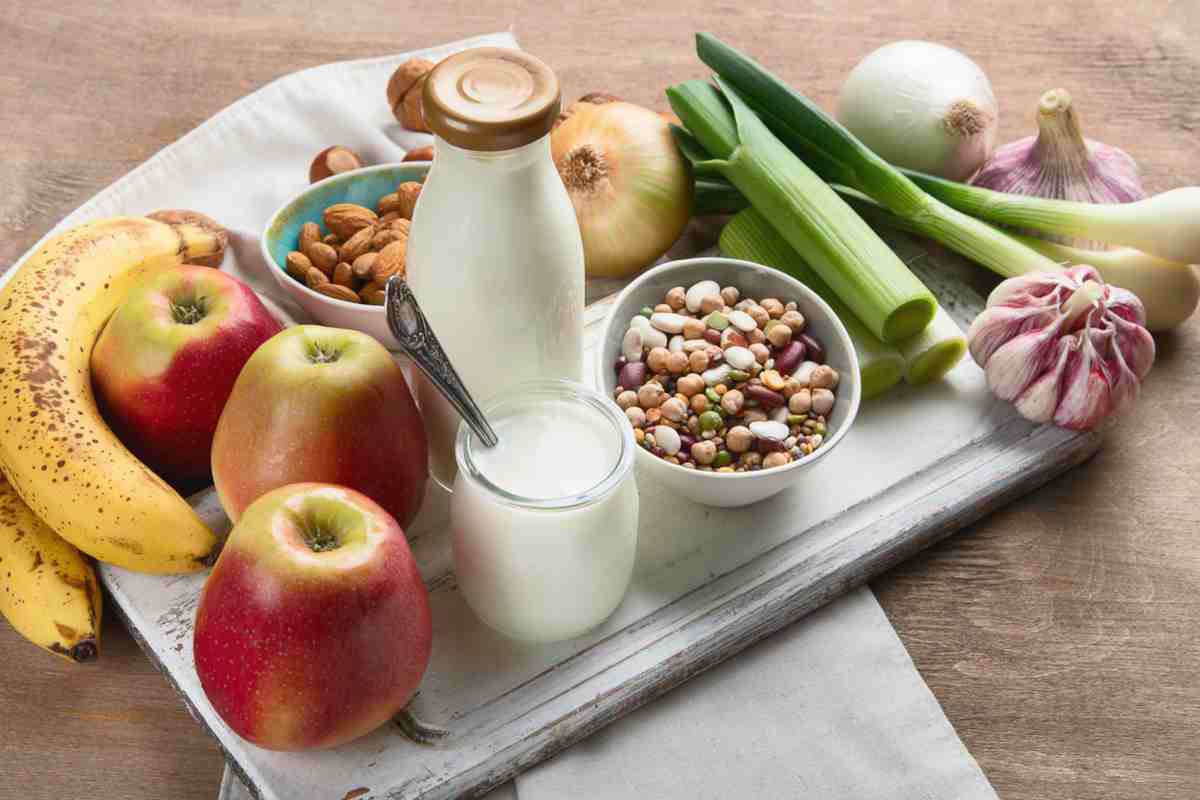Everything you need to know about probiotics, from the potential health benefits to the signs that your gut bacteria is out of balance.
🕒 9 min read
What are probiotics?
The term 'probiotics' describes the use of live 'friendly' bacteria and occasionally yeasts, for their positive effects on health. The most commonly used probiotics are those that produce lactic acid, such as Lactobacilli and Bifidobacteria. These bacteria are acid tolerant, so a significant number survive passage through the stomach to reach and colonise the large intestines, where they have beneficial effects on digestion and immunity.
What are the benefits of probiotics?
So called 'good' or probiotic bacteria play an important role in maintaining intestinal health. They produce lactic and acetic acids as well as natural antibiotics which discourage the growth of the less beneficial bacteria that produce gases and may contribute to symptoms such as flatulence, bloating, pain and diarrhoea.
Another benefit of probiotic bacteria is that they produce short-chain fatty acids, which act as a major energy source for intestinal lining cells. These short-chain fatty acids are also absorbed from the colon and transported to the liver, where they have helpful effects on cholesterol metabolism.
The gut-brain axis is another area of interest. Bowel bacteria secrete substances that have indirect effects on the brain, so your microbiome may play a role how you cope with stress and anxiety. Serotonin, for example, is best known as a brain transmitter that regulates mood, but as much as 90 per cent of your body's serotonin is actually made by cells lining the digestive tract – and the right balance of gut bacteria is thought to be important for stimulating its production.
In addition, serotonin helps your brain to filter out all the sensations involved with moving solid wastes through the gut, so you aren't aware of them. If the microbiome becomes disrupted, then changes in serotonin secretion may mean these sensations are brought to the fore and increased sensitivity of stretch receptors may trigger the discomfort felt by people with irritable bowel syndrome (IBS). This is why probiotics for IBS might be worth considering.

Super20 Pro
Our best-selling probiotic
- 20 billion live cultures from 5 well-researched strains
- Contains Lactobacillus acidophilus, Lactobacillus paracasei, Bifidobacterium lactis and Bifidobacterium bifidum
- Supports the protective intestinal microflora in the gut
Much of our immune system is present in the lining of our intestines, with white blood cells being 'primed' in lymphoid tissue (Peyer's patches) by bacteria present in the gut. This helps to stimulate immune responses to bacteria and viruses as we encounter them in the environment.
A Cochrane analysis of 12 trials involving 3,720 children and adults, found that probiotics reduced the chance of experiencing at least one to three acute upper respiratory tract infections by 47 per cent, shortened a cold by 1.89 days, reduced antibiotic prescription rates by 35 per cent and days off school.
Vitamins, minerals and probiotics have a synergistic action as micronutrients are needed to boost the production of antibodies and other infection-fighting chemicals. One study found that taking probiotics plus multivitamins and minerals significantly reduced the duration of common cold and 'flu episodes by almost 2 days, compared with a similar group taking multivitamins and minerals alone. The researchers felt this was most likely through an effect on the activity of T-lymphocytes – the cells that regulate immune responses.
When all this is put together it's clear that if your microbiome loses its bacterial diversity, or becomes dominated by one type of bacteria, your health may suffer.
Knowing your gut bacteria
How it all begins
While in the womb, our bowel remains sterile but after birth it quickly becomes colonised by bacteria encountered in the birth canal, within the environment and, after weaning, on our food.
By adulthood, our large bowel contains an estimated 3.8 x 1013 (trillion) bacteria. Together with the fungi and other microorganisms present, this community of living microbes is known as the microbiota (or less specifically as the microflora).
Living in harmony?
A term that's used more often than 'microbiota', is 'microbiome', which consists of the microbiota plus other microbial products (e.g. proteins, nucleic acids, genes, toxins and signalling molecules) present within a well-defined 'theatre of activity', such as the human gut.
The microbiome contains over 1,000 different bacterial species which, together, are estimated to have 150 times more genes than the human genome. These gut bacteria produce hormones; in fact, the microbiome is considered to act like an endocrine organ that can influence our mood, energy metabolism and insulin resistance.
As a result, our gut bacteria may have significant impact on glucose control, cholesterol levels, obesity, sleep, energy levels and fatigue in ways that are not yet fully understood.
Scientists have suggested that we all belong to one of three different patterns of gut bacteria, or enterotypes, which are as distinct as your blood group.
These bacterial patterns – Bacteroides dominant, Prevotella dominant or Ruminococcus dominant – appear to affect your efficiency in extracting energy from food and may explain why some people find it harder to lose weight than others.
Your gut bacteria pattern may also dictate how well you react to some drugs, the diseases you develop, and your susceptibility to vitamin deficiencies.
People in the Bacteroides group, for example, have better levels of vitamins C, B2 and B5, while those in the Prevotella group have higher levels of B1 and folate.
How to keep your gut bacteria in balance
Your bowel is designed to empty regularly, which means you lose beneficial probiotic bacteria every day, alongside their less desirable relatives. Normally, these 'good' bacteria are replenished by the multiplication of bacteria that adhere to your gut wall and those that live within your appendix (if you still have one) providing you're giving them what they need.
Prebiotic fibre
The type of diet you eat has a profound effect on your bowel bacterial balance, as different species of bacteria thrive on different types of carbohydrate, fibre and protein.
Some forms of fibre selectively stimulate the growth of friendly digestive bacteria in the bowel. Known as prebiotic fibre (e.g. fructo-oligosaccharides, inulin), these cannot be broken down and absorbed by less desirable gas-forming bowel bacteria, but can be used as a food source by our immune-stimulating, lactic acid producing bacteria. Prebiotic foods include onions, leeks, asparagus, garlic.
Globe artichoke, for example, has numerous beneficial effects on digestion and is a source of inulin, a prebiotic fibre that stimulates the growth of beneficial digestive bacteria. Fructo-oligosaccharide and inulin supplements are also available.

Prebiotic foods help to feed the good bacteria in your gut.
A Mediterranean diet
Emerging research suggests that following a Mediterranean style diet, which provides lots of vegetables, fish and olive oil, can increase levels of probiotic bacteria in the gut by almost 10 per cent compared with a meat-rich Western style diet. Lifestyle factors, such as alcohol and smoking, can impact your bowel bacterial balance, too.
Probiotics
Live 'good' bacteria are naturally found in fermented foods such as kimchi, sauerkraut, kefir, kombucha, sourdough, miso, tempeh and some yoghurt, so eating these helps to shape your microbiome. However, as many of these foods can have quite strong flavours that you may not be too keen on, or able to eat on a regular basis, taking a daily supplement is an easier way to obtain the benefits.
And in the future...
Researchers predict that within five years, doctors will assess your microbiome and prescribe drug treatments and doses based on your gut type, as a form of personalised medicine. The use of gut microbe transplants (known as a trans-poo-sion) may even become mainstream.
Scientists who use special DNA probes to identify which species of bacteria are present in the gut have found dramatic and long-term changes in the balance of the intestinal microbiota following antibiotic treatment.
Among the most commonly used penicillin antibiotics, ampicillin and amoxicillin, persistent changes in gut microbiota were found, including the depletion of Lactobacillus species.
Taking ciprofloxacin for five days changed the abundance of roughly one third of gut bacterial species and, although the microbiota mostly returned to normal one month after stopping ciprofloxacin treatment, several types of bacteria failed to recover, even after this relatively short course of antibiotics.
Another study found that taking clindamycin for 7 days greatly reduced the diversity of Bacteroides species present and these did not return to their original balance for up to 2 years after stopping clindamycin treatment.
One of the most effective ways to reduce dysbiosis during and after a course of antibiotics is to take a probiotic supplement to replenish your levels of 'good' bacteria. The results from 31 trials, involving 8,672 people, confirmed that taking a probiotic supplement can prevent even the most serious form of antibiotic-associated diarrhoea, caused by over-growth of Clostridium difficile, in adults and children.
The study also confirmed that probiotics are safe and effective when used alongside antibiotics in patients who are not immunocompromised or severely debilitated.
What happens when gut bacteria are out of balance?
An imbalance in the digestive bacteria in the gut is known as dysbiosis. Gut dysbiosis can also cause a number of digestive symptoms, including bloating, flatulence and diarrhoea (this may also explain why diarrhoea is the most common gut side effect and affects between 5 per cent and 35 per cent of people taking antibiotics). It's also associated with long-term intestinal problems such as diverticular disease, irritable bowel syndrome and inflammatory bowel disease.
Signs and symptoms of dysbiosis
Although the early symptoms of dysbiosis mainly affect the bowel, others include fatigue, joint pain, poor concentration, anxiety and even depression. Different people will experience different symptoms, based partly on the balance of bacteria present in their bowel, and the way these interact with the genes you have inherited.
While the symptoms of dysbiosis may be compatible with irritable bowel syndrome, this is not a diagnosis you should make yourself. Always seek medical advice if you experience a change in bowel habit – especially if you also notice other red flag symptoms such as unexpected weight loss or blood in the stools (these can be a sign of bowel cancer which, when diagnosed early, is more easily treated).
Latest research suggests that gut dysbiosis also increases the risk of health problems affecting other parts of the body, including asthma and allergies, diabetes and arthritis. This is because gut bacteria help to prime the immune system. In short, it seems that just about any persistent physical or psychological symptom could be related to dysbiosis.
Taking oral probiotic supplements appears to be safe with few side effects reported – but that doesn't mean one probiotic supplement is the same as any other. If you're looking for the best probiotics, here are a few things to consider.
How many strains are included? You want a product that supplies at least three, and preferably four or more, different strains for optimum benefits.
Is each strain individually identified? For example, instead of plain Lactobacillus rhamnosus, does it contain Lactobacillus rhamnosus NCIMB 30174 or another characterised strain that is backed by research?
How many of each strain are present? Look for the CFU (colony forming units) number as this tells you how many live bacteria are provided in suspended animation per dose. Select a supplement providing a known quantity of probiotic bacteria, such as 5 to 50 billion CFU per dose. Supplements that are enteric coated, which improves the survival of probiotic bacteria as they pass through the stomach, can contain less (e.g. 10 million freeze-dried probiotic bacteria) and still provide beneficial effects.
Check the shelf life of the supplement. Those close to their expiry date will contain fewer live probiotic bacteria than those with a longer shelf life. Also check whether the supplement needs to be refrigerated. Supplements containing freeze-dried bacteria which are held in suspended animation do not need to be kept chilled.






